Get to know this year's recipients, read their winning article, and learn about their plans for building upon their existing research.

Organic Process Research & Development (OPR&D), in partnership with the ACS Division of Organic Chemistry, is proud to announce the winners of the 2024 Organic Process Research & Development Outstanding Publication of the Year Lectureship Award:
David Cantillo, C. Oliver Kappe, Bhanwar K. Malviya, and Nikola Petrović
This award honors the research team behind an outstanding article published in an issue of Organic Process Research & Development in the preceding year that demonstrates creativity and impact in the field of process chemistry and related disciplines associated with reaction scale-up. C. Oliver Kappe, David Cantillo, and colleagues were selected for their article “Scaling-up Electroorganic Synthesis Using a Spinning Electrode Electrochemical Reactor in Batch and Flow Mode.”
Get to know each of the researchers below.
Prof. David Cantillo
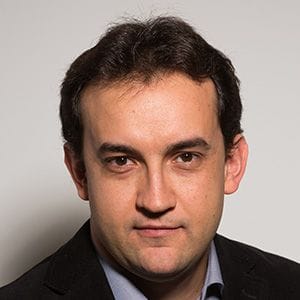
Prof. Cantillo studied chemistry at the University of Extremadura, Spain. In 2011, he obtained his Ph.D. in organic chemistry at the same university under the supervision of Prof. Jose Luis Jimenez. Then, he moved to the University of Graz as a postdoctoral researcher within the group of Prof. Kappe. At the end of 2015, Prof. Cantillo joined the Research Center Pharmaceutical Engineering (RCPE) as a Senior Scientist, where he became Scientific Area Head in 2018. The same year, he started his independent academic career at the University of Graz as an Assistant Professor. Prof. Cantillo joined The University of Queensland in 2023. His research group focuses on synthetic organic electrochemistry. In particular, the group explores the use of electrical current to develop novel synthetic methodologies and more sustainable routes for the synthesis of medicines, as well as process scale up using continuous flow technology.
Prof. C. Oliver Kappe
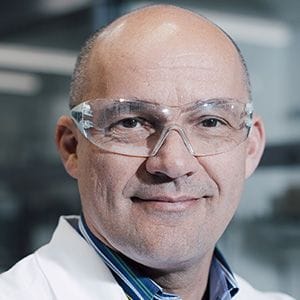
Prof. Kappe is a Professor of Chemistry at the University of Graz and Scientific Director of the Center of Continuous Flow Synthesis and Processing (CCFLOW) at RCPE GmbH. He received his diploma (1989) and his doctoral (1992) degrees in organic chemistry from the University of Graz and, after two postdoctoral stays at the University of Queensland and Emory University, returned to Graz in 1996 to start his independent academic career and was appointed Full Professor in 2011. Prof. Kappe has an extensive general experience and a more than 30-year track record in synthetic/physical organic chemistry and enabling synthetic technologies communicated in more than 500 scientific publications For the past decade, the focus of his research has been directed toward flow chemistry/microreaction technology, encompassing a wide variety of synthetic transformations and experimental techniques. Prof. Kappe’s research group is actively involved in projects dealing with API synthesis and manufacturing, employing a number of different enabling and process intensification strategies.
Dr. Bhanwar K. Malviya
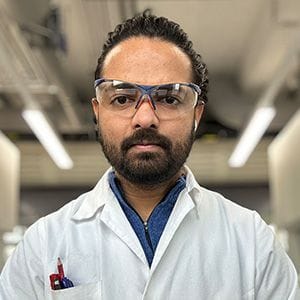
Dr. Malviya worked on the use of electrochemical strategies in batch & flow for the synthesis of API intermediates and process intensification for the pharmaceutical industry. He obtained his Ph.D. in Chemistry (2022) at Sukhadia University, Udaipur, India. He is currently working as a postdoctoral researcher in the Kappe group at the University of Graz, where he is developing novel electrochemical reactor designs that enable seamless scale up to multikilogram per day quantities. During the last seven years of his research career, Dr. Malviya has published more than 20 articles in reputed international scientific journals.
Nikola Petrovic
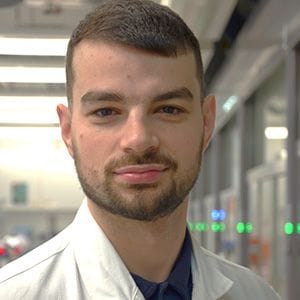
Mr. Petrovic is a Ph.D. student at CCFLOW at the University of Graz. He received his B.Sc. degree (2021) in chemistry and his M.Sc. degree (2023) in chemical engineering. He has worked on multiple projects in the fields of organic chemistry and flow chemistry including flow crystallization, flow calorimetry, and high T/p reactions. As a part of his Ph.D., Mr. Petrovic is currently involved in multiple electrochemistry projects with potential industrial applications.
Read the Interview with the Researchers
What does this award mean to your group?
This award symbolizes a great team effort and recognizes the importance of providing solutions to chemical manufacturing problems. It also encourages us to keep working on the further development and improvement of the system we have created.
How did this team come together to collaborate on this research?
We have been interested in the scale up of electrochemical reactions for several years. The traditional technology to achieve scale up of electrolysis is the so-called parallel plate reactor, in which two flat electrodes face each other with a narrow separation between them. This type of system is operated in flow mode. The narrow interelectrode gap results in a reduced cell resistance and a very high electrode surface area to reactor volume ratio, which is very beneficial for reaction efficiency. However, the narrow gap also provokes clogging issues when reaction mixtures are not homogeneous. The combined expertise in flow chemistry and synthetic organic electrochemistry on the team was perfect to tackle the issue and develop a novel technology that enables flow electrolysis of slurries.
What do you think is the biggest challenge currently in your area of research?
Although synthetic organic electrochemistry has been utilized for many decades, commercial processes have typically focused on relatively simple molecules. During the past two decades, the scope of synthetic organic electrochemistry has significantly expanded, including more complex transformations and functional groups. In this context, reactor technology also needs to adapt, as the current electrolyzer designs, well established for over 50 years, may not always be suitable for some novel transformations.
What new research are you doing to build on the findings you described in your paper?
We want to demonstrate the versatility of the reactor design by implementing additional electrode materials, including 3D-electrodes such as foams and felts, as well as expanding the range of applications of the system. We are also looking into how model-based optimization techniques can help implementing the reactor for the performance of particularly challenging chemistries. An important feature of the reactor is that the mass transfer properties can be readily controlled via the electrode spinning speed. We want to leverage this property and improve processes in which mass transfer plays a critical role.
What would your advice be to someone just starting out in the field?
Synthetic organic electrochemistry is a rapidly growing field, with many newcomers constantly joining the area. Unfortunately, it is rare that synthetic electrochemistry basics are taught at the university level. There are several tutorial reviews that have been published over the past five years with very useful guidance and basic concepts to get started. It might also be a good idea to initially team up with an expert in the field and gain knowledge through collaboration.
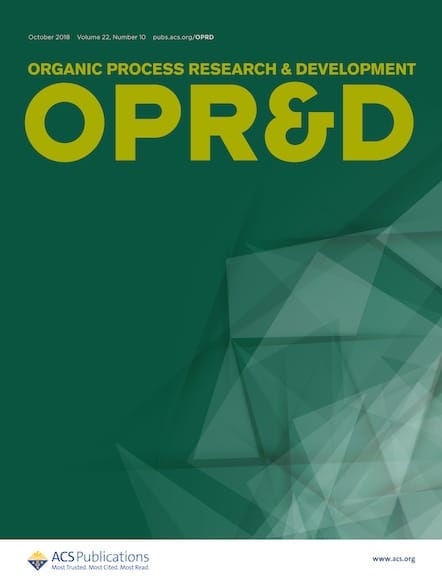
Scaling-up Electroorganic Synthesis Using a Spinning Electrode Electrochemical Reactor in Batch and Flow Mode
DOI: 10.1021/acs.oprd.3c00255
